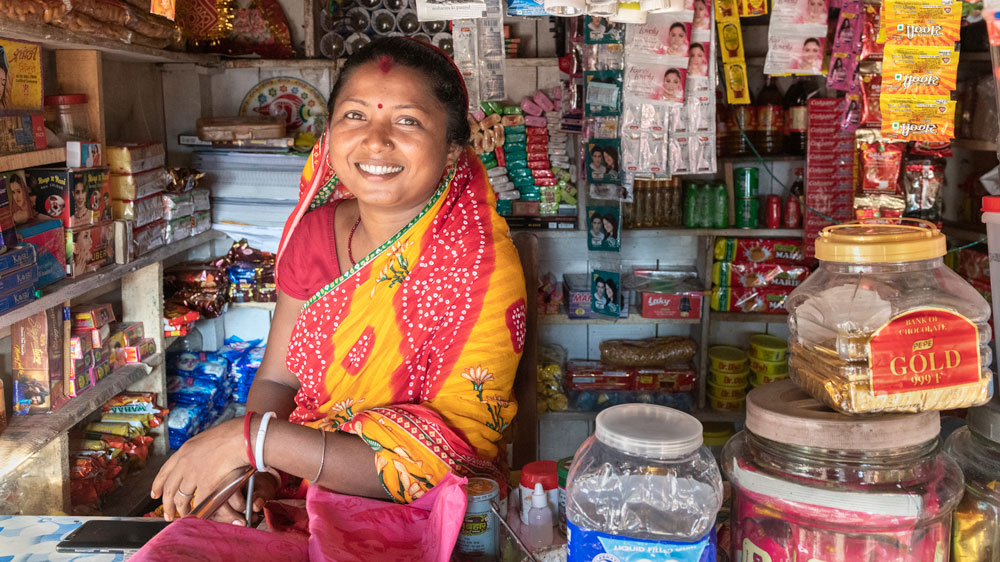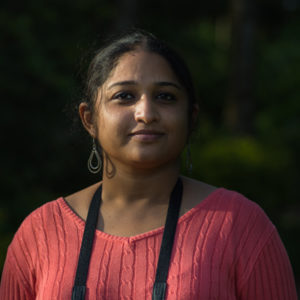If you are driving on the highway passing through the Naranga village in the Pakur district of Jharkhand, India, you will undoubtedly notice a bustling little shop situated at a busy crossroads. Not only is it convenient for basic food and home goods purchases, but it is also a popular spot for locals to stop for tea and conversation. If you were to stop, you would likely meet the successful storeowners Golapi Devi, a mother of three, and her husband Nandlal Maraiya.
It was not always like this. Nandlal used to migrate to neighboring states in search of work, primarily seasonal day labor. Golapi was primarily a homemaker, sometimes working in the fields while he was away to make ends meet.
In 2017, Trickle Up launched a program in Naranga, in partnership with India’s National Livelihoods Mission (NLM), to promote sustainable livelihoods and savings for local women. The first step was to organize participants into savings groups—known as Self-Help Groups under the NLM—where they can mutually save, access credit, share advice, and build relationships. Golapi, however, was reluctant to join due to fears of accruing unrepayable debt. Following several conversations with field staff, she overcame her suspicions, envisioning a future where she and her husband could support their family without migrating.
“This (savings) group has completely changed the way I think. It has made me believe that if others can, so can I.”
Golapi Devi
As a member of the savings group, Golapi was selected as a participant in the Mobile Connections to Promote Women’s Economic Development (MPOWERED) project implemented by Trickle Up in partnership with Tata Communications. MPOWERED aims to ensure that the world’s poorest women are included in the global information revolution, and in doing so, make a significant and replicable contribution to eradicating extreme poverty. MPOWERED provided smartphones to 1,000 women living in extreme poverty in Jharkhand and Odisha, India. The phones were loaded with a specialized livelihoods coaching application developed to support participants in real time as they began earning income through farming, livestock, and shop keeping.
Golapi received a seed grant of INR 3000 (US $42) and her first mobile phone. While many women in her group chose to pursue agricultural production or livestock rearing, Golapi expressed a desire to open a shop. Initially, she sold only edibles like chocolates and biscuits. Over time, she expanded to sell most basic items required to run households, such as stationery, costume jewelry, and toiletries. The shop also become a popular hangout for passing vehicles to stop for a break and a bit of friendly conversation over tea and paan—a mouth freshener made with betel leaf.
Today, Golapi and Nandlal’s days consist of trading off running the shop and making market runs in order to restock, in addition to the household chores that accompany a family of five. “This smartphone has changed the way I work. It has become very easy to coordinate with my husband when he goes to the wholesale market to restock our shop. I can check and let him know by the phone if I have forgotten to mention anything. I also know if he is going to be late or is stuck somewhere. I even call up the distributors to have them send the stock directly to my shop. That saves us a lot of time and transportation cost.”
Golapi makes a profit of about INR 300-400 (US $4-6) from her shop each day. She is now confident that she will be able to provide her children access to quality education. Her sons are in the 10th and 12th grades and her daughter, the youngest, is now in 8th grade.

What makes this journey even more special for Golapi is that her husband is an equal partner. “I have always supported her. She has never been alone in her struggle,” says Nandlal. “And I will support her always.”
Golapi has certainly come a long way from being a struggling homemaker. Today she has her own dreams, big ones. “The next step is to make a permanent house for ourselves, and of course, to open my beauty parlor,” says Golapi. “There are no parlors in the vicinity, and I love looking good. I feel most women around me also feel the same way, but do not have the means. I have been in talks with the field staff of Trickle Up to help me start this second business. Then my husband can run the shop and I can run the beauty parlor.”
“I am trying, and I am going to make it happen.”



